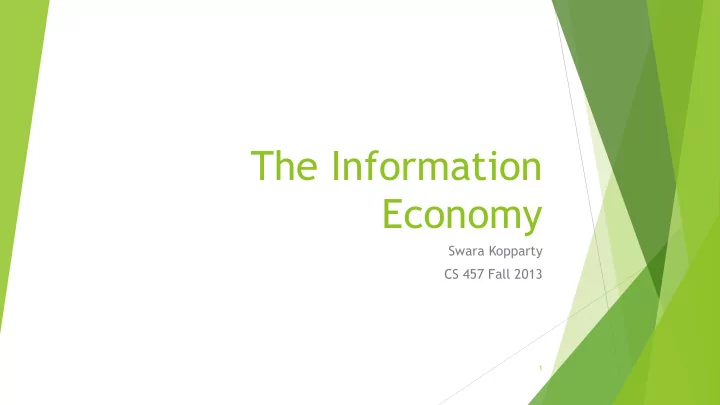

The Information Economy Swara Kopparty CS 457 Fall 2013 1
Outline u What is the information economy u Issues that have arisen since the advent u Evolution into a feedback economy u Rights of creators of information goods 2
What is the information economy? u Information technology Economy u E-commerce u Knowledge Economy u Digital Economy 3
Question u Do we need a “New Economics” for the new age? (I’ve definitely wondered this question – Internet is a pivotal part of the economy) u Thesis – no we do not, refer to technological change that occurred because of the telephone revolution 4
What is Information u Information = anything that can be digitized = encoded as a stream of bits u Information goods = have value, different for different customers u Information goods have high fixed costs, but low marginal costs u Price information according to value, not cost u Value based-pricing leads to differential pricing u Differential pricing based on new vs. old versions of information goods u Ex: Delay in releasing newer versions of a game 5
Protecting Intellectual Property u Important issue that we have discussed before u Eg: Hollywood was petrified when video recorders came out, but now they make most of their money from video sales rather than theater u Choose terms and conditions that maximize value, not maximize protection 6
Information is an experience good u Consumers need to experience it to value it u So how will people buy it before they know how much they value it? It needs to experienced every time that it is consumed u Solution: Branding and reputation u WSJ online -> same logo, same format -> conveys the same quality, same brand, attracts the customer loyalty u Tension between giving away your information and charging them to recover it is a fundamental problem -> discuss it later in the presentation 7
Economics of Attention u “A wealth of information creates a poverty of attention” - economist Herbert Simon u Competition for attention; people are forever searching to distill the vast information on the internet -> most popular website are search engines! u Internet is different because allows for one-to-one attention, customized ads (like we have discussed previously in this course) 8
Technology Takeover u Value of the web lies in its ability to provide immediate access to knowledge u How many of you still even read books? Curious about a topic - > go to the internet u New -> ability to manipulate information u Whole new arena of systems competition - > who can build the fastest processors, the sleekest computer 9
Information Economy and Network Effects u Value of a product depends on how many users there are = network effects u Important for a product to gain critical mass; then the going gets easier u Can gain critical mass by having strategic important partners, being smart about timing 10
Evolution into A Feedback Economy 11
Evolution into a feedback Economy u Internet has the ability to harness these word of mouth networks u Bidirectionality of the internet -> organizations can reach audience of millions, but individuals can also voice their opinions on public forums u Will discuss online feedback mechanisms (reputation systems) u Reputation systems = individuals share opinions on companies, products, and world events 12
Evolution, Contd. u Best known application of reputation systems: used to build trust in online markets u The widespread presence of online feedback mechanisms is changing people’s behavior in various ways (movies, stocks, restaurants) u Amazon, Ebay, Epinions, Yelp u Affects different aspects of organizations u Brand building, gaining customers – good reputation = more customers, vice versa u Product development, quality control – use reaction to re-engineer products u Supply chain quality assurance – organizations can better assess suppliers u Intensifies relationship between producer and consumer; involves game theory 13
Online Feedback Mechanisms u Modern instantiation of ancient concept of word-of-mouth u Often the primary enabler of economic activity u Differences u Enormous scale because of low-cost bidirectionality of internet u Automated feedback mediators (algorithmic analysis of feedback) u Trust issues and problems with interpreting subjectivity 14
Case Study: EBay u Best online feedback mechanism to date u Transactions backed by trust, not by formal contracts u Trading relationships are one-time deals usually (89 percent) u Buyers feedback on sellers 60 percent of the time, sellers on buyers 52 percent of the time u Feedback is positive: 99.1 percent positive, 0.6 negative, 0.3 neutral 15
Case Study: Ebay u Conclusions of all the work done on ebay feedback mechanisms: feedback affect price and occurrence of sale, but effects are ambiguous u Impact is higher for more expensive/riskier transactions u Most important aspects are u Overall number of positive and negative ratings u Number of recently posted negative comments (posted in last week) 16
Evaluation Criteria u Two most important concrete evaluation criteria (Dellarocas) u 1) Expected payoffs of the outcomes induced by mechanism for various classes of stakeholders over their appropriate time horizon u 2) Robustness of the outcomes against different assumptions about behavior u 3) Thoughts? u How has feedback shaped your e-commerce experiences? u How has feedback shaped your everyday experiences? u Do you provide feedback? 17
Content Creation u Tim Kreider on the struggles of content creators with the advent of the internet u Abundance of information means diminished value u Diminished value of creators of content u Artists’ salary is exposure, not money – is this fair? u Information/content is often distributed free of charge, so how do content creators make money? u Thoughts? 18
References u “Information Rules”. Hal Varian and Carl Shapiro, 1999. u “The Digitization of Word of Mouth”. Chrysanthos Dellarocas. Management Science; Vol 49 No. 10; 2003. u “Slaves of the Internet, Unite!”. Tim Kreider. New York Times. Oct 206, 2013. 19
Recommend
More recommend